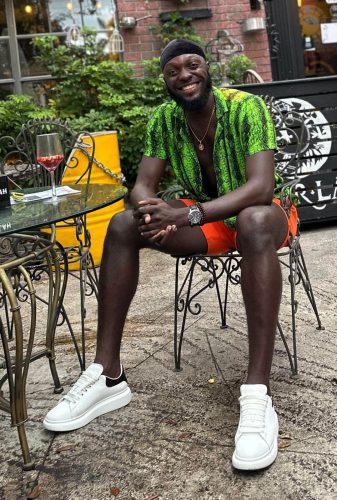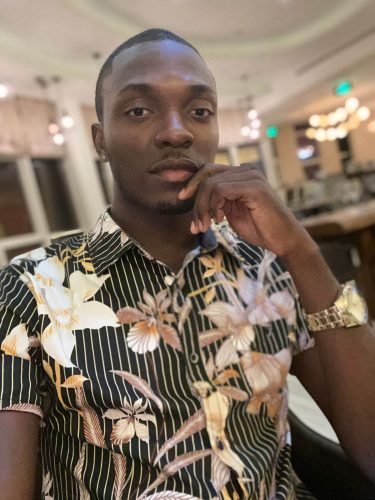By Rae Wiltshire
For David Loncke, the segue to mental health counsellor was natural given that all his previous jobs were service-related. People often used to compliment him on his listening skills and express appreciation for his role in their well-being. These comments gave Loncke the impetus to consider becoming a mental health professional, prompting him to begin researching the field. He soon realised that a clinical and therapeutic path was the best fit for him.
A mental health counsellor with the Ministry of Health, he said he chose this profession because he realised that he could help people navigate their lives and emotions in a way that brings about positive change. Loncke mentioned that his love for the field continued to grow once he entered the profession. He believes that any job that creates such feelings is worth holding onto. He believes that through advocacy he can help to spread awareness about some of the challenges he experiences as a mental health counsellor which can help persons to prioritise their mental health.

Loncke believes one of the main challenges for a person seeking support is the stigma associated with accessing mental health services. Many people only see mental health support as necessary for those experiencing psychosis, Loncke said. He emphasises that mental health can either be good or bad. On the negative side of mental health he highlighted issues such as anxiety and mood disorders and asserted that if services are accessed early, many symptoms can be alleviated, preventing a person’s mental deterioration. He stressed that one’s mental health can be affected by a range of issues such as marital problems or financial struggles.
Some people might be unwilling to seek help and Loncke highlighted the importance of combating stigma so that more people can seek out these services and receive the necessary help for an improved quality of life.
Loncke has noticed that one of the significant challenges in mental health is the struggle men face. Men often grapple with mental health issues due to societal expectations and the stigma associated with seeking help. Loncke believes that Guyanese society has a misguided perception of what men’s behaviour should be, expecting men not to cry or express their emotions. This behaviour from men can lead to stereotypes that label such men as gay or too sensitive. These challenges, Loncke has observed, often leave men feeling unheard and lacking support. Many men simply want to be heard and have a support system, but societal expectations frequently make this inaccessible. Loncke advocates for sensitisation through advocacy and discourse to remedy this issue by helping men to feel comfortable sharing their mental health challenges in a non-judgemental supportive group.
Another challenge Loncke has observed is that often there are not enough personnel to manage the many clients in need of mental health services. This shortage can make it challenging to provide high-quality service, especially during times of increased demand. To counter this, Loncke adheres to a strict schedule and relies on external support to ensure good service.

Loncke also mentioned that when someone has a particularly bothersome challenge, it can linger with him, especially if he is unable to help. He often has to remind himself that it is not his fault and believes that a multidisciplinary team approach is crucial to mitigating the challenge. He explained that such approaches rely on the collaboration of various professionals, such as nurses, social workers, and school guidance counsellors, to provide more comprehensive patient care.
Loncke acknowledged that self-care is very important for any profession that can become demanding. As a professional counsellor, he believes it is critical to have a support system for one’s own well-being. Loncke emphasised the importance of finding something within the profession that a counsellor is passionate about. He acknowledged that the field is still growing and can sometimes become overwhelming.
“You need to find things that ground you,” Loncke advised. He stressed that counsellors need to have a support system to maintain their wellness. “While you help people, help yourself. There has to be that equilibrium going on at all times,” he insisted.
Additionally, Loncke wanted to encourage people to be more mindful about their well-being, as it benefits both patient and counsellor when patients demonstrate a commitment to a better quality of life.
Loncke listed several activities vital to his own well-being. He checks in with loved ones and travels to destress, finding that cultural exploration and an interest in various art forms, including music and painting, enrich his life. He frequents the gym and emphasised the importance of rest and maintaining healthy boundaries to sustain mental health.
Travelling and experiencing diverse cultures and the peaceful nature of some people abroad made Loncke wonder what is lacking back home. He often engages with these people to learn more about their way of life. Loncke believes that full immersion in activities is common elsewhere but rare in Guyana. He noted that many things are often taken for granted here and urged Guyanese to appreciate the little things in life. Witnessing this has allowed Loncke to create a more meaningful life for himself, which in turn helps him serve others more effectively.
Art plays a significant role in Loncke’s life, as it allows him to view the world more intimately and enhances his self-care. He advocates for art therapy as a valuable solution for clients who might struggle with other forms of therapy, emphasising the importance of practitioners being mindful of the best approach for their clients’ well-being. Loncke practises art in his own life through various forms of creative expression. He creates videos about mental health issues, cooks, paints, and writes poems and stories for his relatives and friends. Sharing a laugh with a loved one is also a cherished form of artistic expression for Loncke.
Even though therapy can become overwhelming, Loncke finds it relaxing and calming because the intent of the conversation is to achieve a positive outcome. He cautions, however, that the success of treatment is not entirely up to the mental health professional; the client must also meaningfully commit for the treatment to be effective. Loncke explained that focusing on a person’s well-being relaxes him. Although the job has its challenges, the primary objective is rehabilitation and the well-being of another person and that focus is what keeps him going on the down days.
For his future, David Loncke plans to expand his private practice and venture into entrepreneurship, to establish businesses that cater to a person’s well-being. Individuals can seek help at the Mental Health Unit at 252 Quamina Street, Georgetown, or by calling 223-6624. Loncke can also be reached at 713-9857. Additionally, he is available at the West Demerara Regional Hospital in the Psychology and Well-Being Unit for those needing assistance in that region. Loncke expressed concern about the suicide rate in Guyana, emphasizing that this should be seen as a sign for people to take their mental health seriously.






